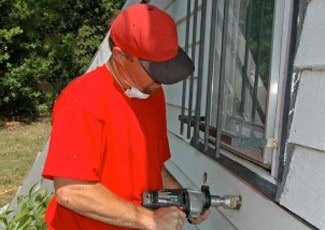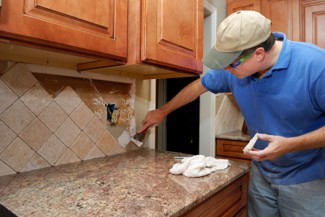Offset the risks of home remodeling by being properly insured
For several years, the home remodeling industry mirrored the economy, with homeowners putting off renovations to conserve cash. But that’s poised to change, according to a new study, prompting experts to warn homeowners to consider the home insurance ramifications before they begin renovation projects.
“Nobody goes into a renovation thinking that the worst is going to happen,” says Pete Moraga, a spokesman for the Insurance Information Network of California.
However, a number of things can go wrong, ranging from a fire started by a blowtorch to the rupture of a power line in the back yard.
“I spoke with a few insurance agents and, while this is not a rampant problem, they told me that roof leaks are the most common problem that can arise out of improper renovations or repairs,” says Michael Barry, a spokesman for the Insurance Information Institute.

Home improvement spending is expected to grow by 3.5 percent each year through 2015, according to a Harvard University study released in January 2011. According to the BuildFax Remodeling Index for February 2011, home remodeling activity registered the 16th straight month of year-over-year gains, demonstrating that many Americans are fixing up their homes rather than buying new ones.
While that’s good news for the economy, homeowners who aren’t proactive about their insurance needs could find themselves digging out of a financial hole.
Limiting your risk
The first thing you want to do is make sure your contractor is insured, Moraga says. Contractors should be licensed and bonded. Workers’ compensation would take care of medical costs and lost wages for contractors who are injured on the job. General liability insurance would cover other damages resulting from the renovation process.
If a contractor tells you he’s got it under control, don’t just take his or her word for it, Moraga warns. “You want to see the dates on the policy and make sure that it is still in effect,” he says.
If you’re unsure whether your contractor has enough coverage to protect your risk, contact your insurer before you get started. Your insurer can help you alleviate other risks as well:
• Some homeowner’s insurance policies have vacancy clauses, which forbid you from staying away from your home for a certain period of time. “If you’re out of your house for 30 days because of renovations and something happens during that time, your policy would not cover that,” says Hyacinth Tucker, an Allstate agent in Crofton, Md.
• Costly tools and building supplies could be left lying around your home. Should something happen to them, your coverage may not be sufficient.
• Many homeowners buy expensive appliances or supplies that will be installed during the renovation. It’s important to update your home inventory and the insurance policy to reflect the worth of these items even before they’re installed, since disaster can strike even while they’re sitting unused in your home.
Extending your coverage
For some homeowners who are beginning a major renovation project, it may make sense to buy an umbrella policy, which will extend the coverage for a short time. Since an injured worker could sue both the general contractor and the homeowner, “you may want to consider an umbrella policy where it will extend your liability to $1 million,” Moraga says. “It may cost you another $300 a year.”

Homeowners also might consider buying a builder’s risk policy, which would cover materials and equipment being used during the renovation, Tucker says. “If you have copper pipes, tools or paint sitting around, it would cover that,” she says.
You also may need to increase your homeowner’s insurance policy on a long-term basis, depending on the types of renovations you have done. An additional room may cost more to insure. Likewise, the addition of a pool or a trampoline could affect your policy as well, since each of those items would increase your liability if someone got hurt.
Insurance isn’t something to be concerned with only when hiring contractors. You may run into a problem if you take on a project yourself.
While most accidental damage would be covered by your homeowner’s insurance policy, your insurer could balk if you inadvertently hammer a hole in the wall or make a mess of a project that’s clearly out of your league.
“Your policy won’t cover damage that you do that you’re negligible for,” Tucker says.
If you’re not sure whether a claim on the self-inflicted damage would be paid, check your policy. It should include a list of named “perils” that you are covered, Barry says.
Homeowners who are making renovations to their homes are investing money that would possibly be wasted if insurance needs are not met, whether by the contractor or the homeowner.
“It’s better to be prepared and have disaster not happen,” Moraga says. “An ounce of prevention is always best.”
